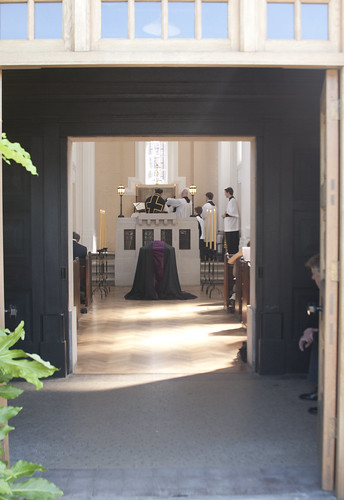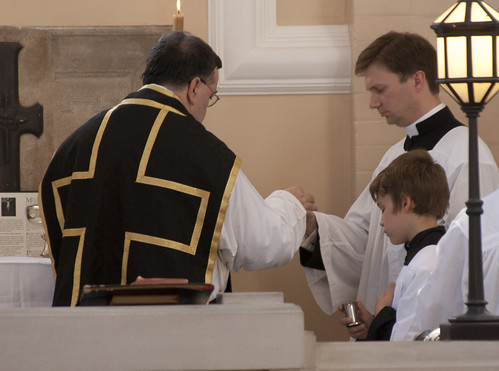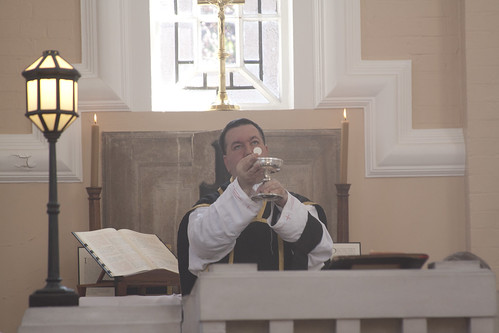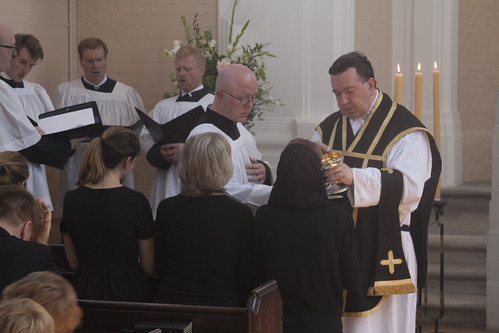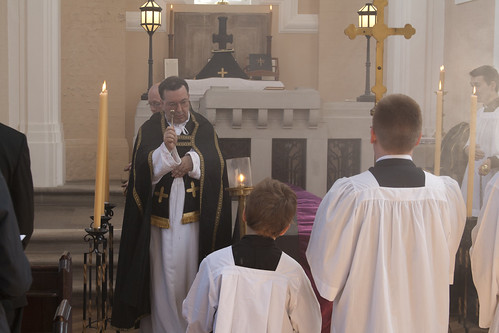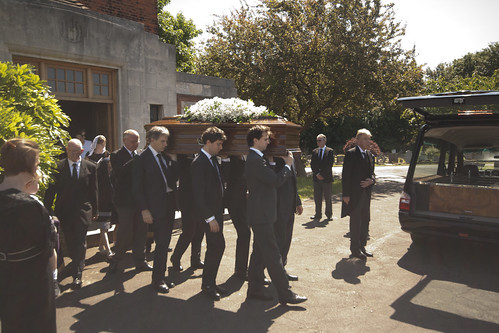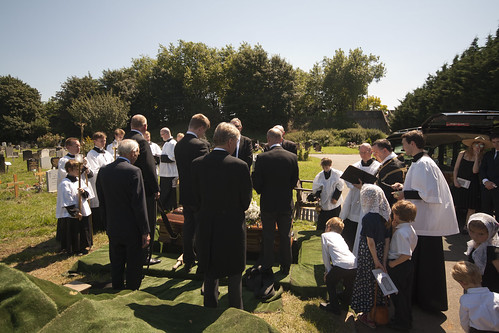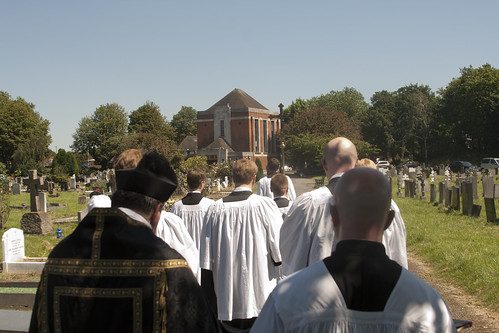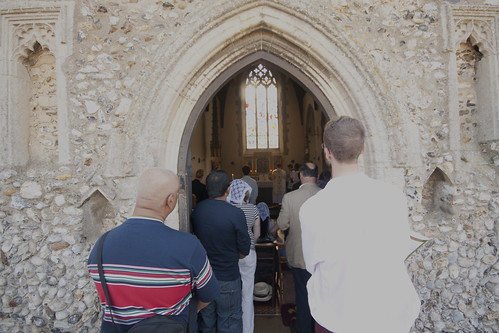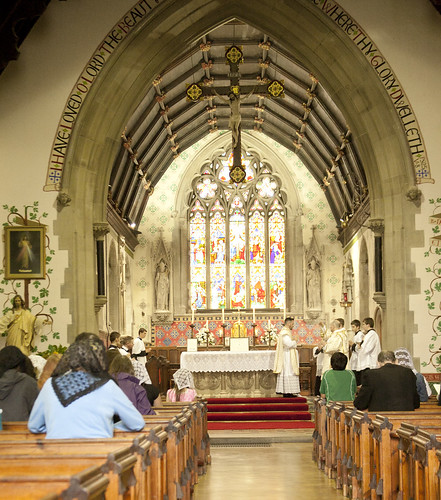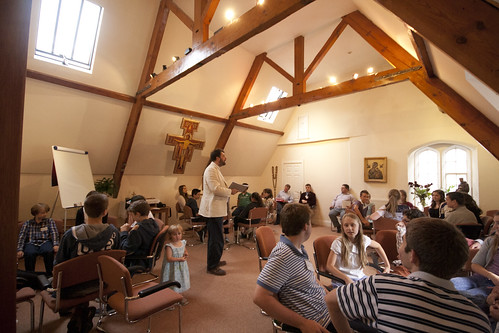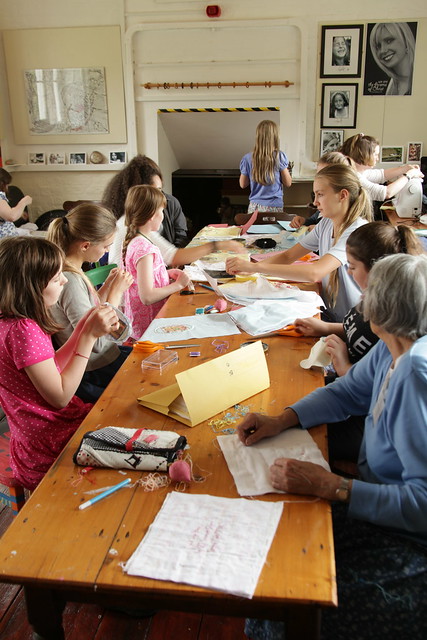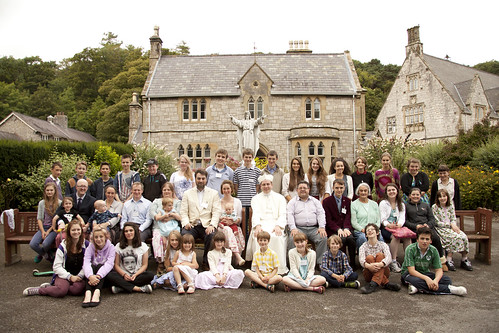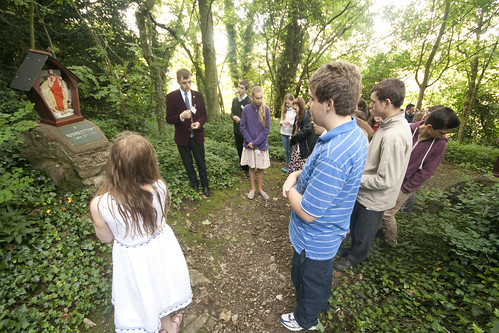Chairman's Blog
Reports of my death are premature
As Mark Twain said.
Seriously, how do they work these things out?
In case you were wondering, I wasn't born in Lancashire either - and certainly not in 1920. And nor is my wife called ... Well, you get the idea.
Support the work of the LMS by becoming an 'Anniversary Supporter'.
Advance notice: Vespers of All Souls in Warwick Street
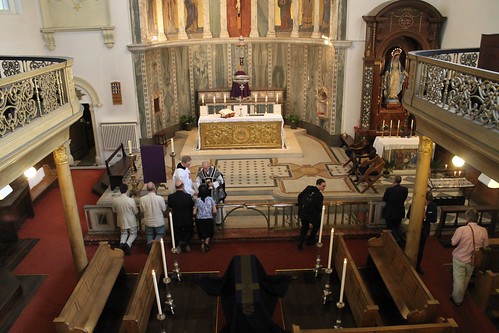 |
| Requiem for Michael Davies organised by the LMS last year, in Our Lady of the Assumption, Warwick Street. The celebrant was Fr Tim Finigan. |
Fr Mark Elliot Smith will officiate.
5:30pm, Wednesday 2nd November (All Souls Day)
Our Lady of the Assumption, Warwick Street, W1B 5LZ
Latin Vespers of the Dead, with polyphony (Viadana and Palestrina)
A new editor for Mass of Ages

The forthcoming edition of Mass of Ages, the magazine of the Latin Mass Society, will be the last edited by Dylan Parry. It has been great working with him, for sadly too short a time, but we cannot regret his reason for moving on: a desire to test a vocation to the religious life. He will be leaving his editorial position at Oremus, Westminster Cathedral's magazine, at the same time.
The LMS has appointed Tom Quinn as Managing Editor of Mass of Ages magazine. Based in London, Tom comes to his new role with many years’ experience behind him as an editor, photographer and writer. He has worked on magazines covering a variety of subjects, as well as contributing to mainstream newspapers. With this wealth of experience, and being a Catholic who has knowledge and enormous sympathy for traditional practices, he is suitably qualified to build on the very successful work done by Dylan Parry, our outgoing Managing Editor.
Dylan leaves us to test a vocation to the Religious Life. The next edition of Mass of Ages, due out in August, will be his last and we take this opportunity to thank Dylan for his work in making Mass of Ages appeal to an ever-increasing readership and assure him of our prayers.
Joseph Shaw, Chairman of the Latin Mass Society, said, 'The Society is very grateful to Dylan for his work on the magazine, and we assure him of our prayers for his novitiate. We are very fortunate to have found such an experienced and highly skilled replacement in Tom Quinn, and look forward to working with him.'
Support the work of the LMS by becoming an 'Anniversary Supporter'.
Anthea Craigmyle: In paradisum deducant te Angeli.
The rather odd-looking chapel is a municipal mortuary chapel, in Chiswick New Cemetry. Although designed with a rather different kind of liturgy in mind, we were able to have the Traditional Mass there without serious difficulty. Although we only managed to fit two candlesticks on the tiny altar.
In paradisum deducant te angeli: in tuo adventu suscipiant te martyres, et perducant te in civitatem sanctam Ierusalem. Chorus angelorum te suscipiat, et cum Lazaro, quondam paupere, aeternam habeas requiem.
May the angels lead you into paradise: may the martyrs receive you at your coming, and lead you into the holy city, Jerusalem. May the choir of angels receive you, and with Lazarus, who once was poor, may you have everlasting rest.
Support the work of the LMS by becoming an 'Anniversary Supporter'.
Reform of the Reform: a brief reply to Fr Hugh
Fr Hugh Somerville-Knapman has done me the honour of replying to my post on the fall-out from the Sacra Liturgia conference. At the risk of appearing engaged in too incestuous a discussion - Fr Hugh is an old friend and fellow student and I've had a similar discussion with him on this blog before - I wanted to pick up on a couple of his points.
First, I should apologise for the offence I've caused; I did get a little carried away. I don't mean to impugn the good intentions of people like Fr Hugh who promote the Reform of the Reform, and indeed I did try to explain the reasoning behind their position in in a sympathetic way.
Second, I should say to Fr Hugh that I certainly didn't have his blog in my sights when I talked about the damage caused by the hype over Cardinal Sarah's words. His blog, like mine, is not, I fancy, primarily responsible for the way things are perceived in Rome, Washington DC, or Archbishop's House in Westminster. I had more in mind banner headlines in the Catholic Herald.
But to business. Fr Hugh makes a surprising assertion about my position. He writes:
Yet, if the full restoration of pre-conciliar worship is the goal, how to achieve it? By fiat, an imposition on the Church as violent as that in 1969 which made mandatory a Mass that few if any laity were really prepared for?
The answer to that rhetorical question is 'Obviously not', but Fr Hugh appears to imagine that I think the answer is 'Yes', and goes on to criticise me quite harshly for a proposal I have never made, never intend to make, and do not agree with. Indeed, I thought the tenor of my post was clear enough: that I envisage progress (at any rate for the foreseeable future) as nothing more than the organic growth of the celebration of the Traditional Mass, a continuation of the progress it has made particularly since 2007.
That is just a misunderstanding. More substantively, Fr Hugh reacts to my criticism of the tactical blunder of the Sacra Liturgia conference people in a somewhat confusing way. What I had said was that the volume of hype forced Cardinal Nichols, Fr Lombardi, and others to react publicly: that is, it made them feel they had to react. This seems undeniable, since they didn't react in this way on the previous occasions Cardinal Sarah has made his point about the desireability of celebration ad orientem, as he did in an interview back in May.
Fr Hugh wants to have this both ways. First, yes there was nothing in the Cardinal's remarks which justified the reaction, because there was nothing very new or startling about them; but at the same time they were worthy of the hype because they were new and startling after all.
Well, whatever you say Fr. The point remains that the reaction came because the remarks were being presented (hyped) as significant, and in the present situation in the Church the reaction was, if not completely predictable, at least very likely. The saddest thing in the whole sorry story is Fr Hugh's assertion, which I am sure is true:
'the organisers did not have any expectation of response'
The Sacra Liturgia Conference has set the cause of the Reform of the Reform back by 20 years. That may not be a bad thing.
The reactions to Cardinal Sarah's words encouraging celebration of Mass 'ad orientem', with the priest facing east as the congregation does, continue to reverberate. In addition to a 'clarification' by the Vatican spokesman, Fr Lombardi, and a letter from Cardinal Nichols to the priests of Westminster Diocese, we have now had a letter from the Chairman of the relevant committee of the US Bishops' conference. All these statements point out that Cardinal Sarah's comments do not change liturgical law, and in slightly different ways claim that the current law favours celebration 'versus populum,' with the priest facing the people. The US letter asserts that a decision to change from vs. pop. to ad orientem celebration by a priest should only be done with the knowledge and approval of the bishop.
None of these statements, any more that Cardinal Sarah's, have in themselves the force of law. Nevertheless, they make public, clear, and official, a view which was up to now not so public, not so clear, and not so official: that celebration vs. pop. is officially favoured to the point that celebrating ad orientem needs, at least, special justification.
The kind of initiatives in which the 'Reform of the Reform' (RotR) consists, at the local level, depend on a degree of ambiguity about what is allowed or favoured by the rules. Such ambiguity abounds in official documents. Are altar girls permitted or actually favoured? Female lectors? Communion under both kinds? The use of the Roman Canon? Silent recitation of the Offertory? The sign of peace? Concelebration? The debate about the rules (unlike the debate on the underlying theology) is not only endless, but both exceedingly boring and ultimately pointless. It suffices that conservative and liberal priests alike can claim a degree of leeway and, when the pastoral and political conditions permit, quietly move things in their favoured direction. The golden rule in such matters is that you don't press for clarification unless you are sure things will be clarified in your favour.
This is the rule apparently forgotten by the organisers of the Sacra Liturgia conference, and their friends in the Catholic media, both on and offline. I certainly don't attribute any blame to Cardinal Sarah, who said nothing more in London than what he has said, without any bad results, on the record before, and, if anything, less than what Cardinal Ratzinger said in the Spirit of the Liturgy in 2000 and Cardinal Schonborn said in a retreat he preached to Pope St John Paul II in the mid 1990s (it was published as 'Loving the Church' in 1996). The problem lay in the hype heaped on his words by others. Not only was the hype false - as just noted there wasn't anything new or big about what he said - but it meant that Cardinal Nichols, Fr Lombardi, and all the others felt that they had to respond. And what sort of response did the organisers imagine they would get? What sort of official atmosphere do they imagine pertains in the Church right now? Where, in heavens' name, have they been for the last few years?
It is this which has put the cause of the Reform of the Reform back by twenty years - back before Cardinal Schonborn's cautiously worded but carefully argued and impassioned plea for worship 'obviam sponso', 'facing the bridegroom', twenty years ago. Is it conceivable, now that Fr Lombardi has nailed the Holy See's colours to the mast, that such an argument could be made in the presence of the Holy Father now? I don't think so either.
Behind this tactical blunder lies a more fundamental strategic mistake. The organisers of the Sacra Liturgia conference were keen to present the whole thing as about the Reform of the Reform rather than about the promotion of the Traditional Mass. The Traditional Mass was included just as part of the Church's rich pattern, and not as in any way a key element. The idea is that too-obvious association with the EF is politically disadvantageous: it is safer to present oneself as wanting to tinker with the (when properly understood, wonderful wonderful) liturgical reform, rather than as rejecting it.
The argument would seem to make sense, but people have been making it ever since the Novus Ordo Missae appeared in 1969, and it has never worked. The first problem is that the things the RotR people want, particularly celebration ad orientem, are interpreted as a de facto rejection of the reform as a whole by overwhelming powerful forces in the Church. I noted in a previous post that this view has its own logic; for present purposes it suffices to note that it is not going away. An auxiliary consideration is that it is suspected, with perfect justice, that many RotR advocates actually want the Traditional Mass anyway.
The second aspect of the mistake is that the Traditional Mass is not today seen as a poisonous, problematic thing at an official level in the Church. Although a much more radical departure from the reformed Mass than RotR ideas, it is treated much more leniently. Cardinal Nichols doesn't fancy his priests celebrating the OF ad orientem, but asked two of them to learn the EF to expand Sunday provision for it in his diocese. Religious Institutes committed to the Traditional Mass are welcomed into dioceses all over England, the USA, and indeed the world, by bishops who are never going to get rid of Altar Girls, Eucharistic Prayer 2, or communion in the hand, in the Ordinary Form.
The reason is not difficult to understand. The Reform of the Reform has the potential, if widely taken up, to turn dozens of parishes into liturgical war zones. Priests who take a stand on any of the major RotR issues can expect confrontations with parishioners with complaints going to the Bishop. People walk out of Mass; there are shouting matches. The development of the Traditional Mass in a diocese works in a completely different way. Here a bishop saves a historic church by giving it to a traditional Institute. There a priest introduces an extra Mass into his timetable for a handful of parishioners. People might complain but the complaints are obviously unreasonable, since it doesn't affect their own spiritual lives. No one need walk out of his favoured Mass never to return. No one has had his spiritual peace shattered. But in the meantime these initiatives have the potential to grow. They draw in the lapsed, they foster vocations. We don't pull down; we build up.
Hard-core RotR advocates will tell us that this is no way to restore the Church. They say we have to 'save' the OF because that is what nearly all Catholics attend. They like to imagine that celebration ad orientem could be rolled out in dozens of parishes in a short time, and that it would be a huge step forward. I don't disagree with the theological arguments they advance; I would just like to point out the real world - that annoying thing which gets in the way of so many fine theories. In this real world, which I at least am condemned to inhabit, this plan is not working. What is working is the steady advance of the Traditional Mass, which give people not a peculiar compromise liturgy, but a coherent liturgical and spiritual life.
There is something else as well. I don't bring to this debate many decades of personal experience. But I have already seen one of the consequences of the Reform of the Reform movement which its advocates are not so keen to advertise. That is sincere and zealous priests having nervous breakdowns. I apologise for putting it here in black and white, but it is something we should face. If you are telling priests to adopt a plan of action, you need to think through the consequences. Putting priests into massive unavoidable conflict has predictable results. Many priests have told us of the spiritual consolations accorded to them by learning and saying, even if only in private, the Traditional Mass. This is something which we can help them do which will be good for them, and if good for them then good for their parishes. Having arguments with Tablet-reading members of the parish liturgy committee does not pack the same spiritual punch.
So perhaps it is not such a bad thing, all things considered, that the cause of the Reform of the Reform has been set back by twenty years.
Support the work of the LMS by becoming an 'Anniversary Supporter'.
Young Catholic Adults: annual retreat at Douai
During the weekend of the 28-30 October 2016, Young Catholic Adults will be running a national weekend at Douai Abbey, it will be led by Fr. Thomas Crean O.P. The weekend will be full-board. YCA will be running the weekend with the Schola Gregoriana of Cambridge of Cambridge who will be holding Gregorian Chant workshops.
There will also be a Marian Procession, Rosaries, Sung Masses, Confession and socials. All Masses will be celebrated in the Extraordinary form.
Please note to guarantee your place this year Douai Abbey have requested that everyone books in 3 weeks before the start of the weekend i.e.7th Oct 2016.
For online booking please see:-
https://v1.bookwhen.com/yca-
Support the work of the LMS by becoming an 'Anniversary Supporter'.
Islam and the decadent West
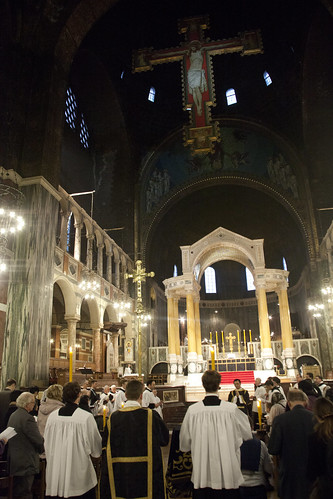
Reposted from last November, in light of the new massacre, in Nice. Requiescant in pace.
---------------------------------
I've not had time to write anything about the terrible massacres in Paris. It was good to be able to attend a solemn Mass for the dead the day after the killings had taken place. Every Mass for the dead, and practically all traditional prayers for the dead, even if they are for the benefit of a specific person or group of persons, is also for 'all the Faithful departed'.
May they rest in peace. And may God protect us all from an unprovided death.
I've done a number of blog posts criticising the approach to understanding and tackling Islam taken by various people, notably the zealous Evangelical David Wood, and the American Syrian Catholic Robert Spencer. In the comments to one of these posts a reader recommended a book by a Jesuit who hails from the Levant, Samir Khalil Samir, which proved to be excellent. Samir has given a very interesting interview to Edward Pentin, in which he explores the way the West is seen from the Arab Muslim perspective, an important factor, obviously, in these attacks.
Here are some extracts:
Muslims know that modernity is coming from the West; this is a fact. Now they see the West as having lost its ethics, especially on sexual questions. They’re very shocked by what they see or hear. … So they say this comes from modernity. They want to reject the excesses and abuses of some principles, but end up rejecting the whole thing. The problem is that the West is responsible, without knowing it, of the reaction of the Muslim world.
...
When Muslims see that, they immediately recall that homosexuality is absolutely condemned in the Quran, with reference to the biblical Lot. See chapters 7: 80-81; 11: 77-82; 15: 58-74; 21: 74; 26: 165-166; 27: 54-55; 29: 28-30; 54: 33-34. In some cases, they were burned alive. Then the Muslims say, “Okay, the West is Christian, Christianity allows this, and so Christianity is not the true religion; it’s a false religion. And we want to be true, to stick to the Quran and to the tradition.”
This means we are partly, indirectly responsible for the fanaticism that is spreading more and more in Islam, as a reaction to the West — not only, but this also — and playing a role in the radicalization of Islam.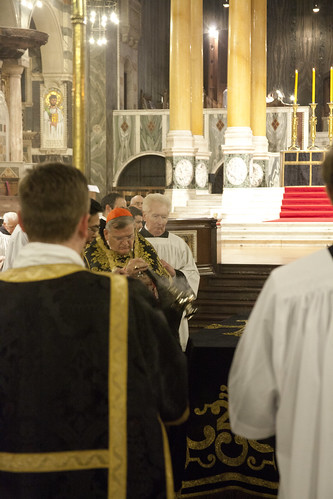
We have to be careful, in responding to terrorism, that we don't allow acts of terror to give a kind of legitimacy and political importance to extreme views, views unpopular even with an ethnic or religious population the terrorists claim to represent. 'Most Muslims reject the ideology of ISIS', goes the mantra, and I have no doubt that it is true. What we do need to do, however, is to consider the issues which give terrorists whatever degree of popular support they do have, for by dealing justly with the legitimate concerns of the population from which the terrorists come, one can begin to drain the swamp.
The Eagles Of Death Metal band was in the middle of the show when the assailants attacked the Bataclan.
Pseudonym of its singer: The Devil Jesse Hughes. In a European tour to defend their new album Down Zipper (!), the first in seven years, the rockers were playing on stage the Title: Kiss the Devil when the first shots were heard inside the room…
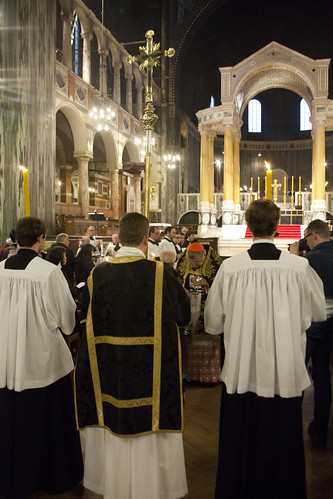 Western culture has major aspects which are an affront to God, to the Natural Law, and to Reason. What I have argued here, is that what we urgently need is a critique of the decadent West which is specifically Catholic, at once sane and radical. As I wrote:
Western culture has major aspects which are an affront to God, to the Natural Law, and to Reason. What I have argued here, is that what we urgently need is a critique of the decadent West which is specifically Catholic, at once sane and radical. As I wrote:"The problems posed by the de-secularisation of the world are not going to be solved overnight, but we can do something to stop making things worse. We can assert the Catholic critique of the decadence of Western culture, especially sexual culture. If there is one concrete gesture which might make those being drawn towards militant Islam stop and think that, perhaps, the Catholic Church may not be part of the problem they are trying to address, then it might be the restoration of head-coverings in church by Catholic women in the West. This would signal a rejection of both decadent sexual mores and of the attack on the difference between the sexes.
"Contemplate the likelihood of this happening any time soon, and you will glimpse the depth of the problem."
Support the work of the LMS by becoming an 'Anniversary Supporter'.
Book now for the Walsingham Pilgrimage!
There is a deadline: Monday 15th August. This is necessary for the caterers and other aspects of the pilgrimage; please don't try to book after that date! Do it before! Do it now!
The Pilgrimage runs from Thursday 25th (we gather in the afternoon and evening in Ely) to Sunday 28th, when we have our big Mass in Walsingham at 2pm, followed by a procession to the site of the Holy House. Some stay the night in Walsingham but it is possible to get back to London on Sunday. If you stay until Monday morning, we have another Mass, sung, in the Slipper Chapel at 10am.
We walk over three days the 55 miles from Ely to Walsingham, accompanied by the Traditional Mass and devotions, in the spirit of the great Chartres Pilgrimage.
Here is a little video about it. The booking page has lots more information.
It is an unforgettable experience, plus hot evening meals!
Show your devotion to Our Lady, walk in the footsteps of your Catholic predecessors, do some penance and take some important intentions to the feet of the Lady of Walsingham.
The cost is £75 for an adult, if you are an LMS member - and you can join at the same time.
There are generous discounts for students, and all are welcome.
Book here.
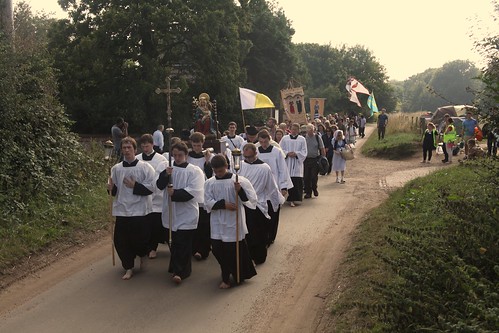 |
| Procession along the 'Holy Mile' to the site of the Holy House in Walsingham, from the Slipper Chapel and Catholic Shrine |
Support the work of the LMS by becoming an 'Anniversary Supporter'.
Last call: SCT Summer School 2016
The dates are Sunday 24th July to Sunday 30th July.
This is something I've been doing since 2005, and it is one of the most exciting, and (for me!) exhausting event I'm involved in each year. We have a little school, for just a week, with maybe 30-40 children: lots of interesting discussions, lots of prayer, lots of fun.
The Summer School is for children aged 11-18; there is NO FEE, parents and guardians make a donation at their discretion. It is run by St Catherine's Trust with the support of the Latin Mass Society.
Click here for our downloadable application form in PDF format.
Click here to apply online
It takes place at the Franciscan Retreat Centre at Pantasaph, 10 minutes from Flint station, half an hour from Chester. We can offer lifts there from London. It has a Pugin chapel, and is home to the National Shrine to St Pio of Pietrelcina (Padre Pio).
As well as liturgy and catechesis, the Summer School introduces children to wide range of subjects, including history, philosophy, history of art, Latin, music and drama, an ideal Catholic supplement to homeschooling or conventional schools, Catholic or not.
We have all sorts of children, from all over England and Wales, Scotland, Ireland, and a few from further afield. It is a great experience for them to meet children from like-minded families, and many come year after year. Don't let your children miss out!
Support the work of the LMS by becoming an 'Anniversary Supporter'.

